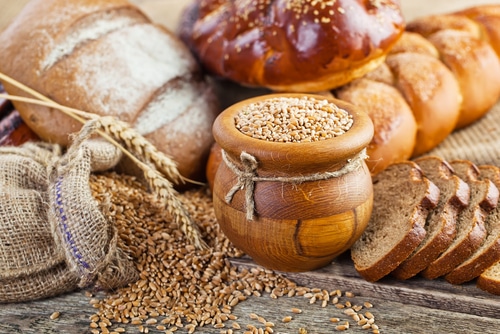
How Whole Grains Differ From Processed Grains
A grain kernel consists of three parts – the germ, endosperm and bran. Whole grains contain all of these elements, while processed grains are stripped of their bran and germ components during processing. That’s unfortunate since these portions contain most of the fiber and nutrients. The endosperm, the part that’s left after grains are refined, contains mostly carbohydrates, a small amount of protein and some B vitamins. Being plant-based, unrefined, whole grains are also rich in antioxidants. Clearly, when you consider whole grains versus refined grains, whole grains are clear the winner from a nutritional standpoint.
Whole grains have a lower glycemic response than refined grains, meaning they aren’t absorbed as quickly and cause less of a blood sugar rise and insulin response. Whole grains that are completely intact have the lowest glycemic response. When you grind grains into small particles to make flour, the glycemic response of the grain increases. It all has to do with particle size.
Whole Grains, Diabetes and Insulin Sensitivity
What are the purported health benefits of whole grains? A number of studies show that people who eat more whole grain foods have a lower risk of some diseases, including heart disease and type 2 diabetes. The opponents of whole grains point out that they’re ultimately broken down to glucose and this causes a rise in blood sugar that triggers a greater insulin release. Current research doesn’t seem to support this.
A number of studies show that whole grains actually increase insulin sensitivity so less insulin needs to be released to get glucose into cells. That bodes well for metabolic health. Two studies showed an inverse relationship between insulin levels and the intake of whole grain foods. Studies comparing whole grain foods to refined grains clearly show the insulin response is lower with whole grain foods.
Research also shows a link between whole grain consumption and a lower risk for heart disease. Both the Iowa Women’s Health Study and the Nurses’ Health Study involving a total of over 100,000 women showed that women who ate three servings of whole grain foods daily had a lower risk for heart disease and stroke. There are a number of reasons why whole grains may protect against heart disease. For one, they’re a good source of magnesium, a mineral important for heart health. They’re also rich in fiber. In addition, they seem to increase insulin sensitivity and improve metabolic health.
Since whole grains are a good source of fiber, they’re also filling. Plus, insoluble fiber is important for healthy bowel function. With so few people meeting their fiber requirements, it’s not surprising that constipation is so common.
Whole Grain Foods, Gluten Sensitivity, and Anti-Nutrients
A lot of the bad rap whole grain foods get comes from the recent interest in gluten sensitivity. Some people have celiac disease and develop intestinal inflammation when they eat gluten-containing whole grains. There are other people who don’t have celiac disease but are sensitive to gluten. People in this category have digestive issues when they eat gluten and don’t feel as well, despite testing negative for celiac.
If you fall into this category, avoid whole grains that contain gluten like wheat, rye, barley, and oats, since they can be contaminated with gluten. There are still a number of people who have no problems when they eat whole grain foods.
Some followers of the “no grain” movement point out that whole grains contain anti-nutrients that block the absorption of some minerals. It’s true that whole grains contain phytates, enzyme inhibitors, tannins, lectins, saponins and other anti-nutrients that make minerals like calcium and zinc less bioavailable – but cooking or soaking grains lowers the levels of these anti-nutrients. Interestingly, some of these phytonutrients may have health benefits. For example, research shows phytates, lectins and saponins help to reduce blood sugar levels. If you’re cooking or soaking whole grains, you’re reducing the anti-nutrient quantity anyway, so the anti-nutrient concerns about grains may not be a big issue unless you eat large amounts of whole grain foods.
The Bottom Line?
Whole grains have gotten a bad rap in some circles recently, but research still shows consumption of whole grains improves insulin sensitivity and lowers the risk for heart disease and type 2 diabetes. The key is to soak and cook whole grains to reduce anti-nutrients and use them as a replacement for refined grains. By doing so, you’ll increase the amount of fiber in your diet and feel fuller.
The best way to eat whole grains is in moderation, as a replacement for processed grains. Make the focus of your diet fruits and vegetables, lean protein and healthy fats, but when you want bread or cereal, choose whole-grain bread or cereal rather than something that’s processed or made with white flour. Keep in mind that whole grains processed into tiny particles, as in making flour, increases its glycemic response, so limit the number of foods you eat that are made from any type of flour.
When you replace refined grains with whole grains, you’re making a healthier choice. Get your fiber primarily from fruits and vegetables but research still supports the health benefits of whole grain foods.
References:
Am. J. Clin. Nutr. 2003. Nov. 78(5): 965-71.
Journal of the American Dietetic Association. 101, 780-785.
Nutrition Action Newsletter. May 2006. “Whole Grains: The Inside Story”
Arch Intern Med. 2010 Jun 14;170(11):961-9.
Related Articles By Cathe:
4 Gluten-Free Whole Grains to Enjoy
Are Whole Grains Good or Bad for Your Gut and for Your Health?

